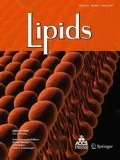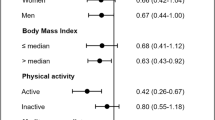Abstract
Olive oil, a major component of the Mediterranean diet, has been associated in some small clinical trials and cross-sectional studies with a reduction in blood pressure. The objective of this study was to assess the association of olive oil consumption with the incidence of hypertension in an epidemiologic cohort, the Seguimiento Universidad de Navarra (SUN) study. The SUN Project is a prospective cohort study whose members are all university graduates. The recruitment and follow-up of participants is made using mailed questionnaires. Diet was assessed using a semiquantitative food frequency questionnaire previously validated in Spain, with 136 items. Outcomes of interest were newly diagnosed cases of hypertension, as reported by participants in the follow-up questionnaires. Logistic regression models were fit to assess the risk of hypertension associated with olive oil consumption. For the present analysis, we have taken in consideration the first 6,863 participants, with at least 2 yr of follow-up. After a median follow-up time of 28.5 mon, the cumulative incidence of hypereension was 4.7% in men and 1.7% in women. A lower risk of hypertension was observed among participants with a higher olive oil consumption at baseline, but the results were not statistically significant (P=0.13 for the linear trend test in the multivariate model). However, among men, the adjusted odds ratios (OR) (95% confidence intervals) of hypertension for the second to fifth quintiles of olive oil consumption, compared with the first quintile, were 0.55 (0.28–1.10), 0.75 (0.39–1.43), 0.32 (0.15–0.70), and 0.46 (0.23–0.94), respectively (P=0.02 for linear trend). No association was found between olive oil consumption and the risk of hypertension among women. In conclusion, in a Mediterranean population, we found olive oil consumption to be associated with a reduced risk of hypertension only among men. The lack of association observed among women might be attributed to the overall lower incidence of hypertension found among females and the resulting lower statistical power.
Similar content being viewed by others
Abbreviations
- CI:
-
connfidence interval
- MDP:
-
Mediterranean dietary patterns
- MET:
-
metabolic equivalents
- MUFA:
-
monounsaturated fatty acids
- OR:
-
odds ratio
- SUN:
-
Seguimiento Universidad de Navarra (University of Navarra Follow-up)
References
Trichopoulou, A., Costacou, T., Barnia, C., and Trichopoulos, D. (2003) Adherence to a Mediterranean Diet and Survival in a Greek Population, N. Engl. J. Med. 348, 2599–2608.
Martínez-González, M.A., Fernández-Jarne, E., Serrano-Martínez, M., Martí, A., Martínez, J.A., and Martín-Moreno, J.M. (2002) Mediterranean Diet and Reduction in the Risk of a First Acute Myocardial Infarction: An Operational Healthy Dietary Score, Eur. J. Nutr. 41, 153–160.
Appel, L.J., Moore, T.J., Obarzanek, E., Vollmer, W.M., Svetkey, L.P., Sacks, F.M., Bray, G.A., Vogt, T.M., Cutler, J.A., Windhauser, M.M., Lin, P.H., and Karanja, N. (1997) A Clinical Trial of the Effects of Dietary Patterns on Blood Pressure, N. Engl. J. Med. 336, 1117–1124.
Alonso, A., de la Fuente, C., Martín-Arnau, A.M., de Irala, J., Martínez, J.A., and Martínez-González, M.A. (2004) Fruit and Vegetable Consumption Is Inversely Associated with Blood Pressure in a Mediterranean Population with a High Vegetable-Fat Intake: The Seguimiento Universidad de Navarra (SUN) Study, Br. J. Nutr. 92, 311–319.
Salas, J., López Miranda, J., Jansen, S., Zambrana, J.L., Castro, P., Paniagua, J.A., Blanco, A., López Segura, F., Jiménez Perepérez, J.A., Pérez-Jiménez, F., and Perepérez, J.A. (1999) La Dieta Rica en Grasa Monoinsaturada Modifica de Forma Beneficiosa el Metabolismo de los Hidratos de Carbono y la Presión arterial, Med. Clin. (Barc.) 113, 765–769.
Lahoz, C., Alonso, R., Porres, A., and Mata, P. (1999) Las Dietas Enriquecidas en Ácidos Grasos Monoinsaturados y Ácidos Grasos Poliinsaturados Omega 3 Disminuyen la Presión Arterial, sin Modificar la Concentración de Insulina Plasmática en Sujetos Sanos, Med. Clin. (Barc.) 112, 133–137.
Ruiz-Gutiérrez, V., Muriana, F.J., Guerrero, A., Cert, A.M., and Villar, J. (1996) Plasma Lipids, Erythrocyte Membrane Lipids and Blood Pressure of Hypertensive Women After Ingestion of Dietary Oleic Acid from Two Different Sources, J. Hypertens. 14, 1483–1490.
Ferrara, L.A., Raimondi, A.S., d'Episcopo, L., Guida, L., Dello Russo, A., and Marotta, T. (2000) Olive Oil and Reduced Need for Antihypertensive Medications, Arch. Intern. Med. 160, 837–842.
Martínez-González, M.A., Sánchez-Villegas, A., de Irala-Estévez, J., Martí, A., and Martínez, J.A. (2002) Mediterranean Diet and Stroke: Objectives and Design of the SUN Project, Nutr. Neurosci. 5, 65–73.
Martín-Moreno, J.M., Boyle, P., Gorgojo, L., Maisonneuve, P., Fernández-Rodríguez, J.C., Salvini, S., and Willett, W.C. (1993) Development and Validation of a Food Frequency Questionnaire in Spain, Int. J. Epidemiol. 22, 512–519.
Mataix Verdú, J. (2003) Tabla de Composición de Alimentos Españoles, 4th edn., Universidad de Granada, Granada, Spain.
Colditz, G.A., Martin, P., Stampfer, M.J., Willett, W.C., Sampson, L., Rosner, B., Hennekens, C.H., and Speizer, F.E. (1986) Validation of Questionnaire Information on Risk Factors and Disease Outcomes in a Prospective Cohort Study of Women, Am. J. Epidemiol. 123, 894–900.
Tormo, M.J., Navarro, C., Chirlaque, M.D., and Barber, X. (2000) Validation of Self Diagnosis of High Blood Pressure in a Sample of the Spanish EPIC Cohort: Overall Agreement and Predictive Values, J. Epidemiol. Community Health 54, 221–226.
Willett, W.C. (1998) Nutritional Epidemiology, 2nd edn., Oxford University Press, New York.
Fernández-Jarne, E., Martínez-Losa, E., Prado-Santamaría, M., Brugarolas-Brufau, C., Serrano-Martínez, M., and Martínez-González, M.A. (2002) Risk of First Non-fatal Myocardial Infarction Negatively Associated with Olive Oil Consumption: A Case-Control Study in Spain, Int. J. Epidemiol. 31, 474–480.
Barzi, F., Woodward, M., Marfisi, R.M., Tavazzi, L., Valagussa, F., and Marchioli, R. (2003) Mediterranean Diet and All-Causes Mortality After Myocardial Infarction: Results from the GISSI-Prevenzione Trial, Eur. J. Clin. Nutr. 57, 604–611.
Espino, A., López Miranda, J., Castro, P., Rodríguez, M., López Segura, F., and Blanco, A. (1996) Monounsaturated Fatty Acid Enriched Diets Lower Plasma Insulin Levels and Blood Pressure in Healthy Young Men, Nutr. Metab. Cardiovasc. Dis. 6, 147–152.
Esposito, K., Nappo, F., Giugliano, F., Giugliano, G., Marfella, R., and Giugliano, D. (2003) Effect of Dietary Antioxidants on Postprandial Endothelial Dysfunction Induced by a High-Fat Meal in Healthy Subjects, Am. J. Clin. Nutr. 77, 139–143.
Czernichow, S., Blacher, J., and Hercberg, S. (2004) Antioxidant Vitamins and Blood Pressure, Curr. Hypertens. Rep. 6, 27–30.
Soriguer, F., Rojo-Martínez, G., Dobarganes, M.C., García Almeida, J.M., Esteva, I., Beltrán, M., Ruiz de Adana, M.S., Tinahones, F., Gómez-Zumaquero, J.M., García-Fuentes, E., and González-Romero, S. (2003) Hypertension Is Related to the Degradation of Dietary Frying Oils, Am. J. Clin. Nutr. 78, 1092–1097.
Alemany, R., Terés, S., Baamonde, C., Benet, M., Vögler, O., and Escribá, P.V. (2004) 2-Hydroxyoleic Acid. A New Hypotensive Molecule, Hypertension 43, 249–254.
Martin, L.M., Leff, M., Calonge, N., Garrett, C., and Nelson, D.E. (2000) Validation of Self-Reported Chronic Conditions and Health Services in a Managed Care Population, Am. J. Prev. Med. 18, 215–218.
Vargas, C.M., Burt, V.L., Gillum, R.F., and Pamuk, E.R. (1997) Validity of Self-Reported Hypertension in the National Health and Nutrition Examination Survey III, 1988–1991, Prev. Med. 26, 678–685.
Sánchez-Villegas, A., Delgado-Rodríguez, M., Martínez-González, M.A., and de Irala-Estévez, J. (2003) Gender, Age, Socio-demographic and Lifestyle Factors Associated with Major Dietary Patterns in the Spanish Project SUN (Seguimiento Universidad de Navarra), Eur. J. Clin. Nutr. 57, 285–292.
Vicario, I.M., Malkova, D., Lund, E.K., and Johnson, I.T. (1998) Olive Oil Supplementation in Healthy Adults: Effect on Cell Membrane Fatty Acid Composition and Platelet Function, Ann. Nutr. Metab. 42, 160–169.
Author information
Authors and Affiliations
Corresponding author
About this article
Cite this article
Alonso, A., Martínez-González, M.Á. Olive oil consumption and reduced incidence of hypertension: The SUN study. Lipids 39, 1233–1238 (2004). https://doi.org/10.1007/s11745-004-1352-x
Received:
Accepted:
Issue Date:
DOI: https://doi.org/10.1007/s11745-004-1352-x



